Dehydrating Apples for Easy Homemade Apple Chips
This post may contain affiliate links. Read my full disclosure here.
Dehydrating apples is a great way to preserves apples without canning or freezing. Plus, homemade apple chips are a fraction of price of store bought chips. We include tips to prevent browning, fun flavor ideas, and safe storage instructions.
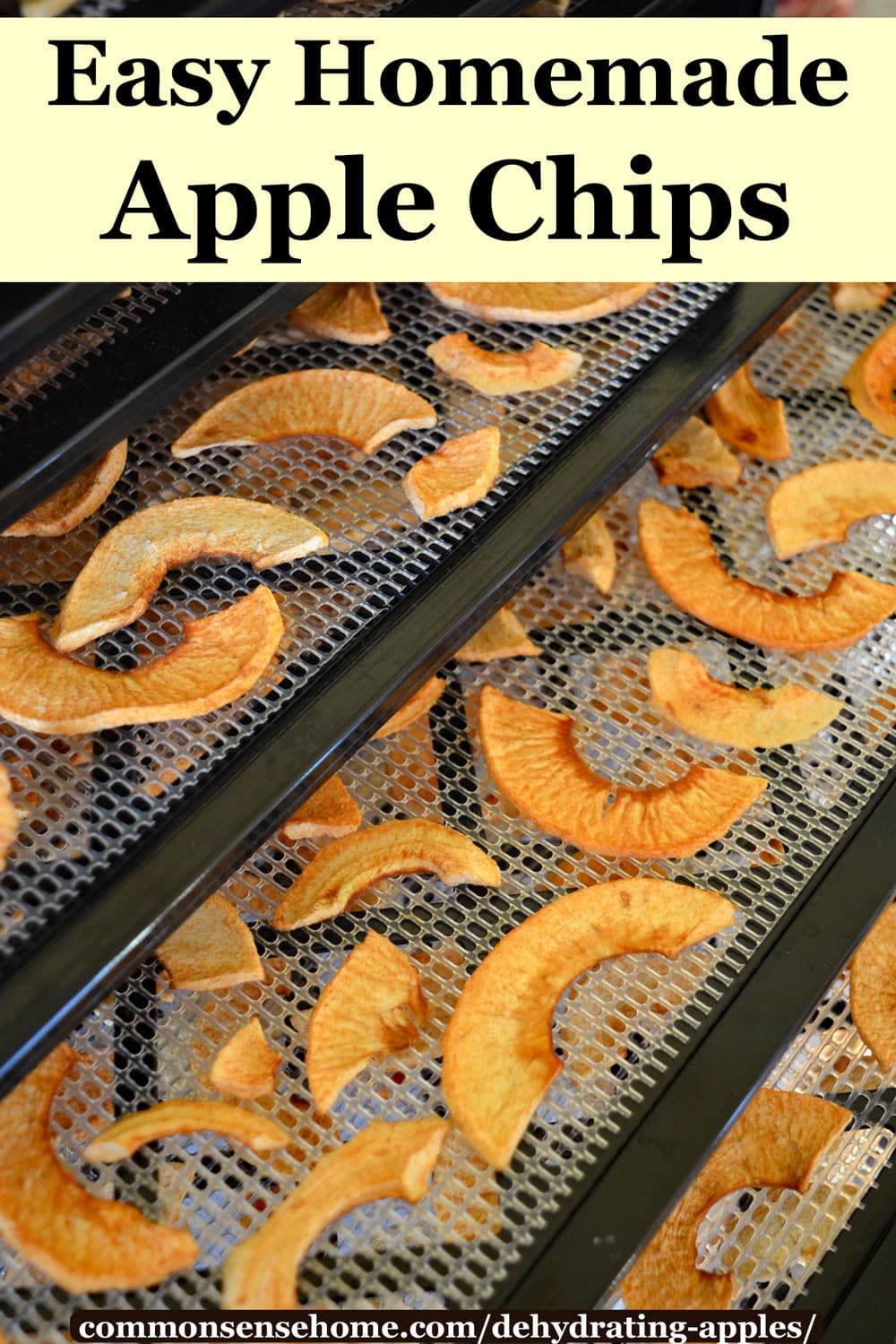
How to Dehydrate Apples
First we’ll start with an overview of dehydrating apples with a food dehydrator. Then we’ll get into more details and talk about oven drying and air drying.
- Prep your fresh apples by slicing and pretreating.
- Load your apples on the dehydrator trays, allowing space between slices for air circulation.
- Dry at 135ºF (57ºC) overnight or until fruit is dry and leathery.
Which apples are best for drying?
I’ve never had a bad dried apple, but some work better than others. Apples with a high moisture content tend to shrink up more during dehydrating.
Some of top apples recommended by Minnetonka Orchards include:
- Pink Lady, Golden Delicious, Kidd’s Orange Red – for dry apple slices that hold their shape
- Fuji, Gala, Cortland – for sweetness
- Granny Smith, Braeburn, Zestar – best tart apples
Apple varieties that naturally resist browning include: Ambrosia, Cameo, Cortland, Empire, Gala, Ginger Gold, Goldrush, Opal, Shizuka, and Snowsweet.
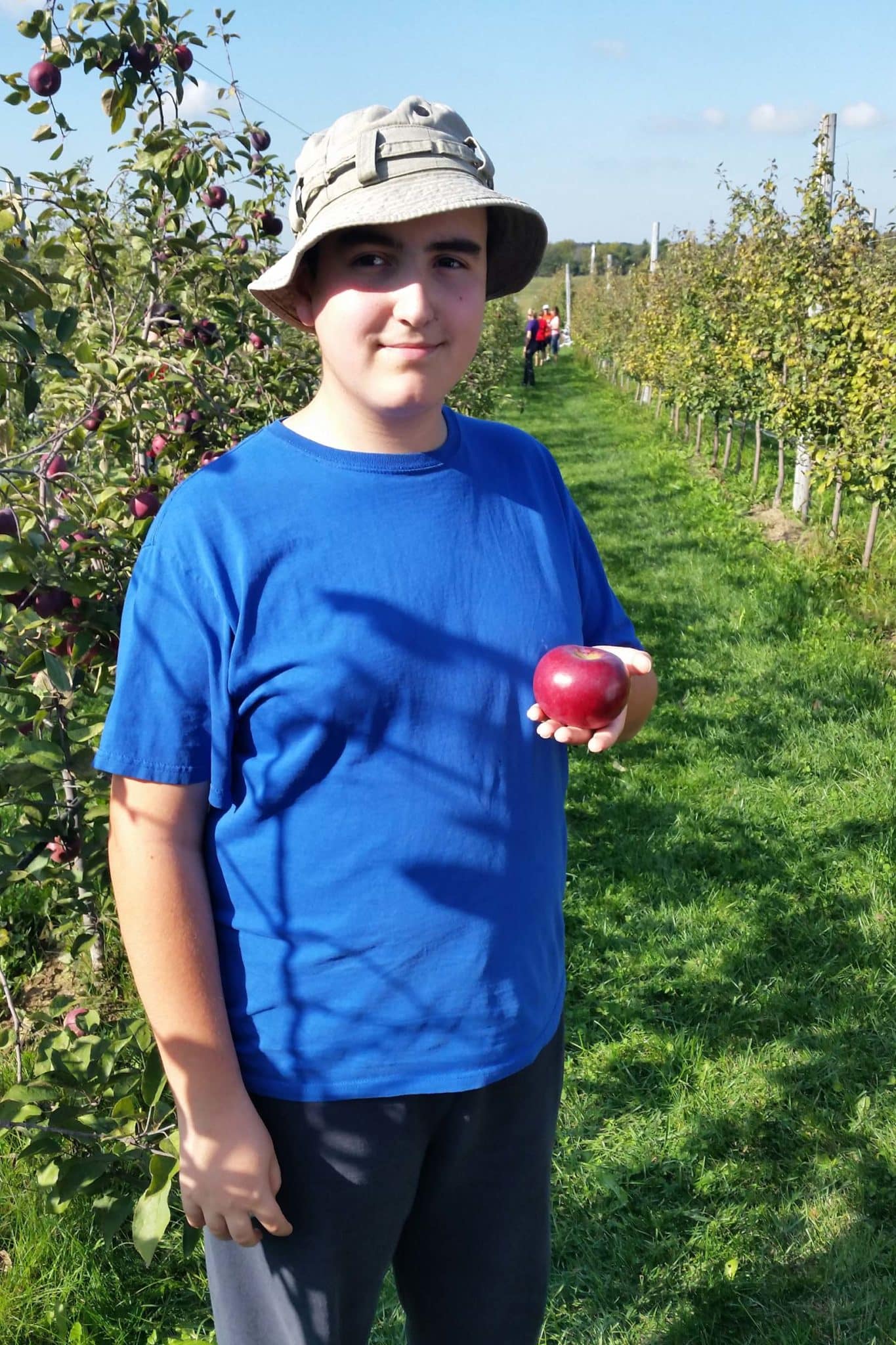
Prepping Apples for Dehydrating
Do you need to peel apples before drying? That’s up to you to decide.
Apples take a little longer to dry with the peels on, but the peels add color, fiber, and texture to the fried fruits.
Sometimes we use a hand crank apple peeler and slicer for making apple rings, so peeling takes no extra time at all. Other times we prep with a paring knife, so peeling would take extra time.
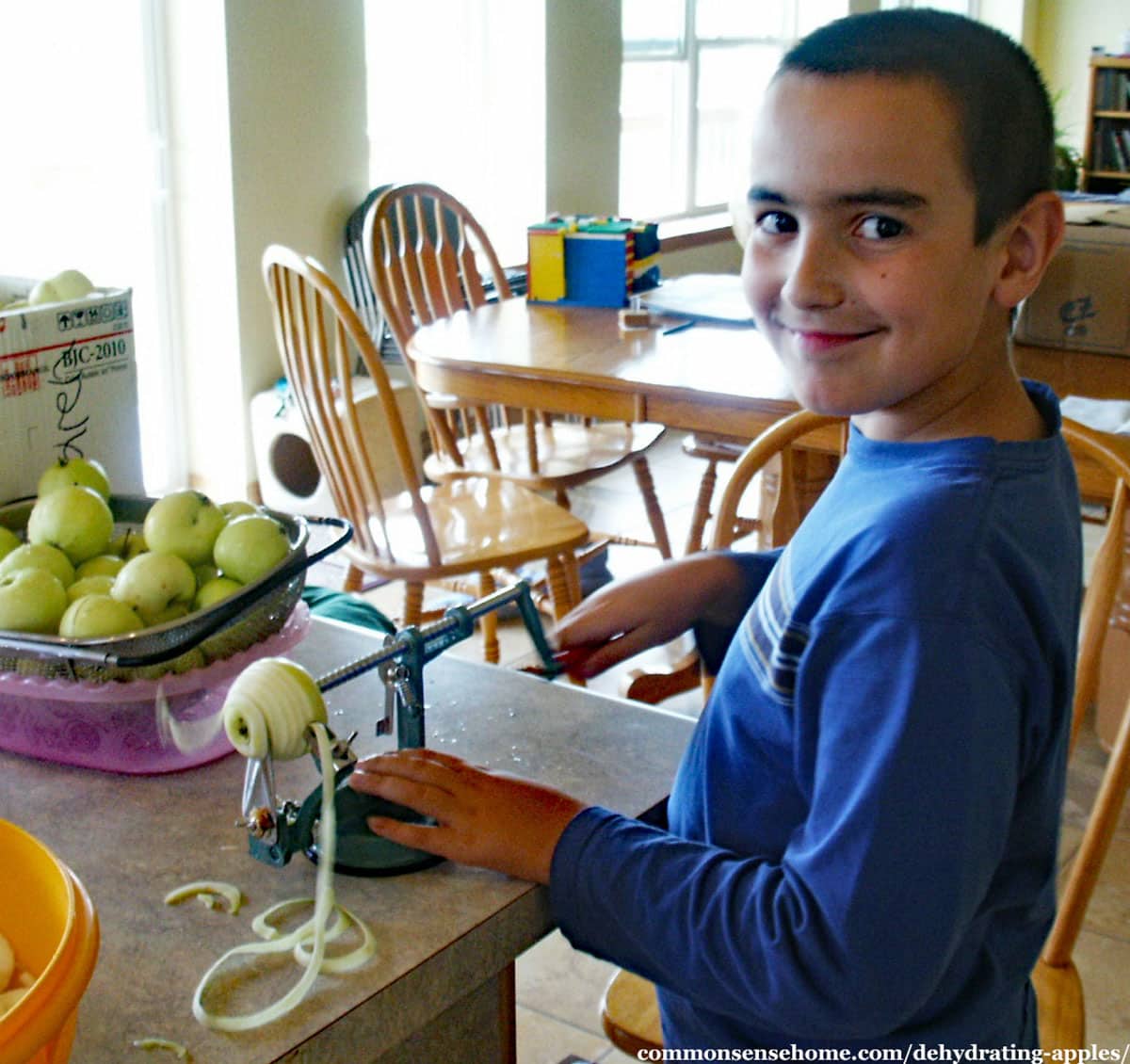
Note: the crank peeler/slicer doesn’t work well with soft apples, so you may want to use those for homemade applesauce instead.
We like to cut our apples around 1/8 inch to 1/4 inch thick. If you make the slices too thick, they can have trouble drying in the center.
How do you keep apples from browning when dehydrated?
Apples turn brown for the same reason metal rusts – exposure to oxygen. When you slice, you trigger biochemical reactions that make your apples look not so great over time.
The simplest way to avoid browning is to dip your apples slices in lemon water. I make lemon water by mixing 1 part lemon juice with one part cold water. For instance, one cup of juice and one cup water.
Soak your apple slice in lemon water for a few minutes before loading them on the drying trays. If you like, you can lightly oil the trays so the apples come off more easily when dry.
We like to top off the slices with a sprinkle of cinnamon and sugar, but you can leave them plain.
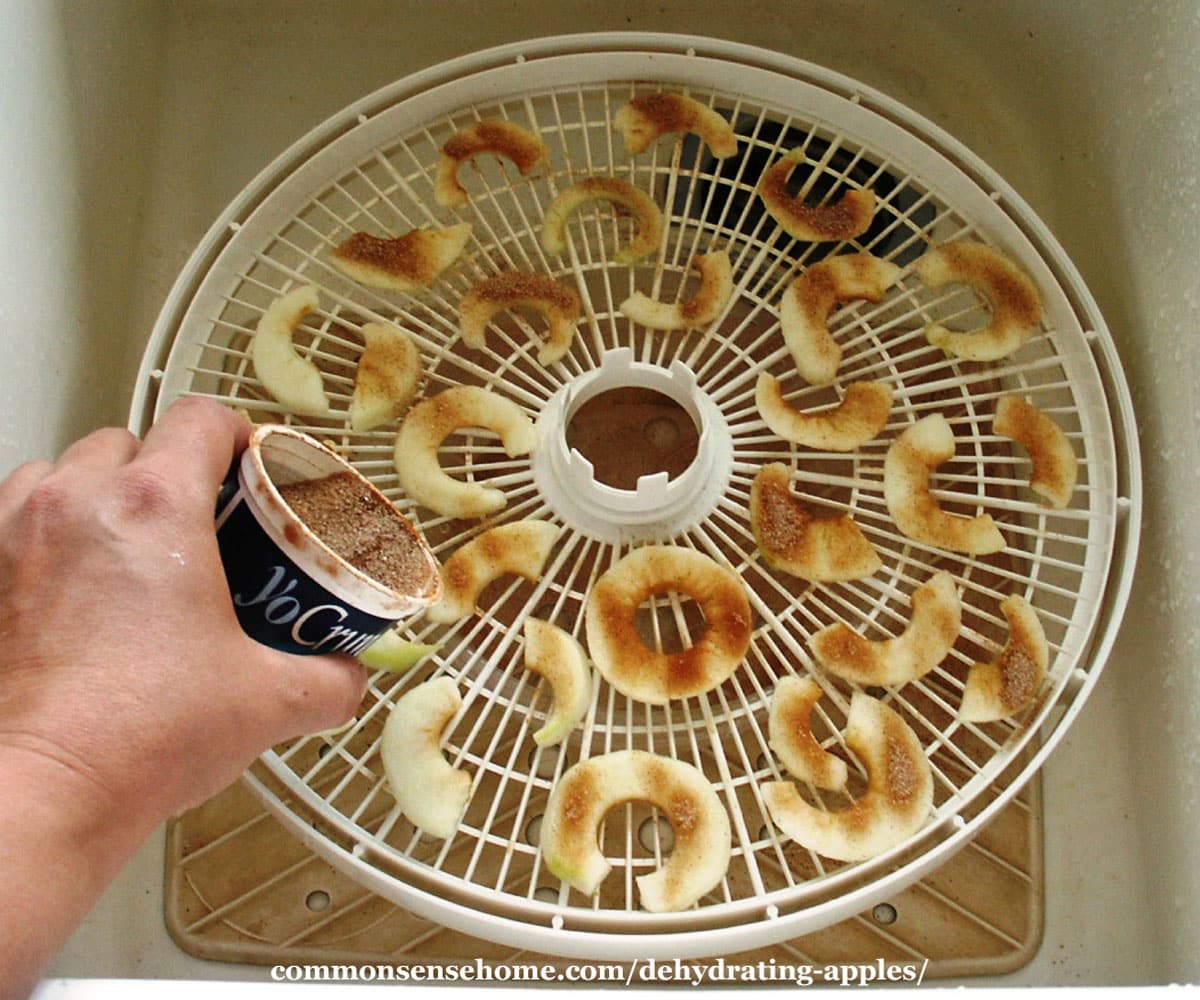
If you want a sweeter dehydrated apple, dip the slices in pineapple juice or orange juice. Cranberry juice and 7-up soda are other options for flavored apple chips.
Don’t have any fruit juice? Use 1 tablespoon salt or apple cider vinegar to 8 cups of water to prevent browning. Or dissolve a 500 mg vitamin C tablet in a cup of water for dipping.
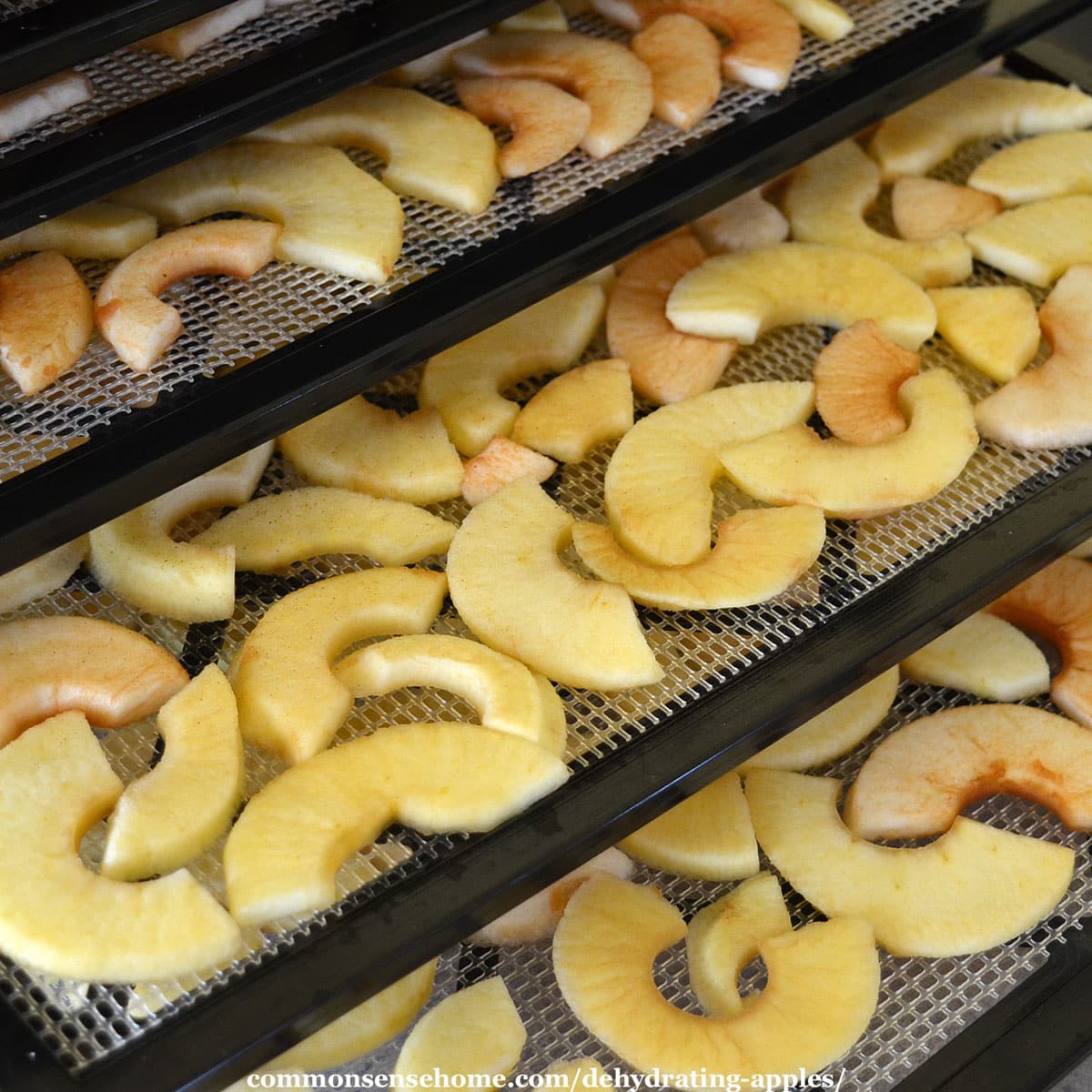
Loading the Apples in the Dehydrator
I like to use the mesh inserts for my dehydrator trays, as they make it easier to unload the dried fruits when they’re done.
When you load the trays, make sure to allow a little bit of space between the sliced apples for good air circulation.
Place the trays in the unit and set the temperature to 135ºF (57ºC). I have an Excalibur and a Snackmaster dehydrator. Both work well, but the Excalibur dries a little faster.
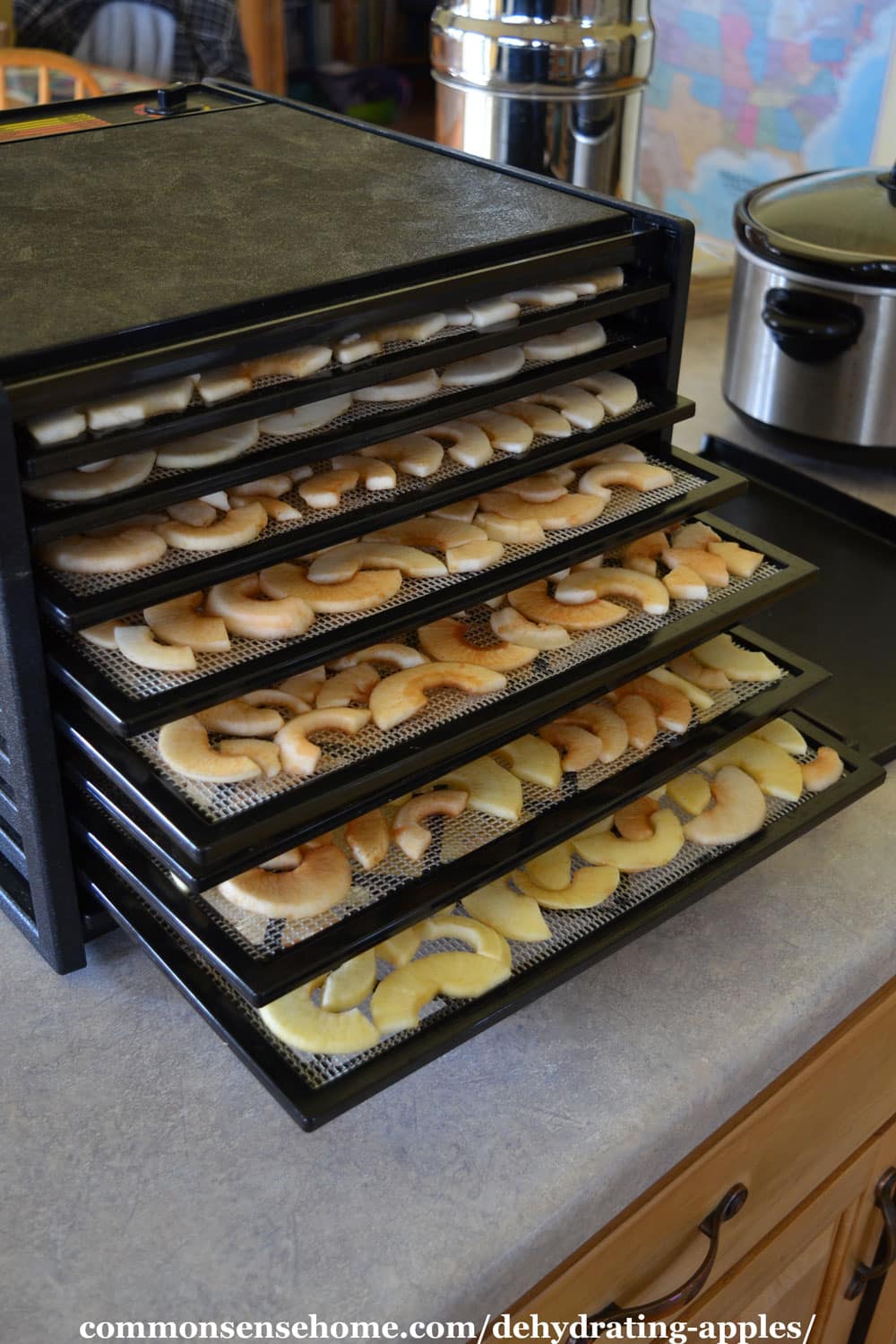
How long do you dry apples in a dehydrator?
Apples should dry in 10 to 12 hours. We usually load the dehydrator late in the afternoon or after supper and let it run overnight.
Would you like to save this?
Don’t worry about getting the apples too dry. Less moisture means crispier apple chips and longer shelf life.
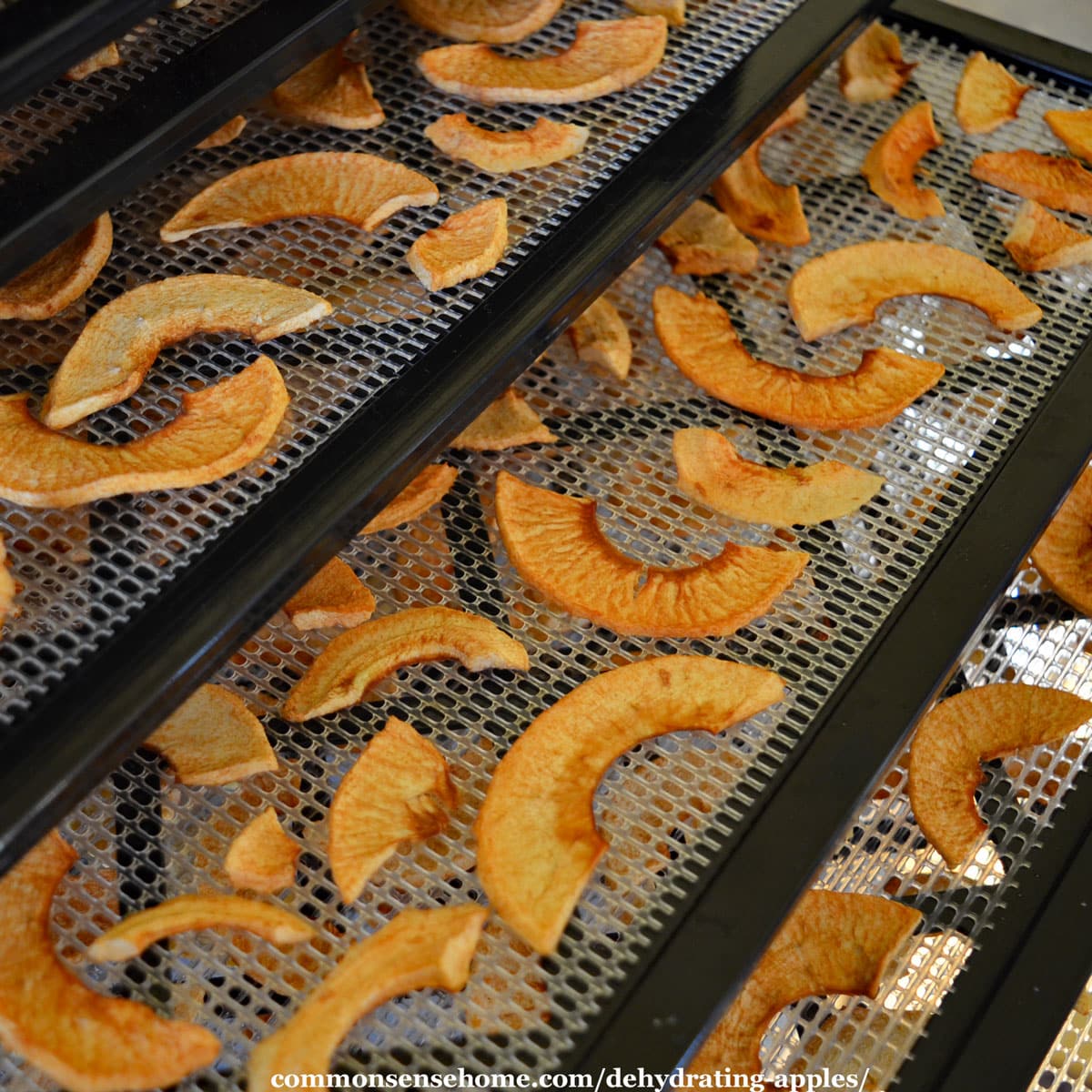
How do you know when the apples are done?
When they’re done dehydrating, most apples will easily snap in half. Some apple varieties stay more spongy, like commercial dried apples.
Note: In humid weather, dehydrating apples takes longer than in dry weather, so plan accordingly.
If you think your apples are dry but they still seem a little soft, try this easy trick to check for dryness.
Put the dried slices in a mason jar and screw the lid on tight. Check the underside of the lid daily for several days, looking for moisture drops.
If you don’t see any moisture, shake the jar, and check again the next day. If you find condensation, get those apples back in the dryer.
By day 3-4, if you don’t have any moisture, your apples should be safe for long term storage.
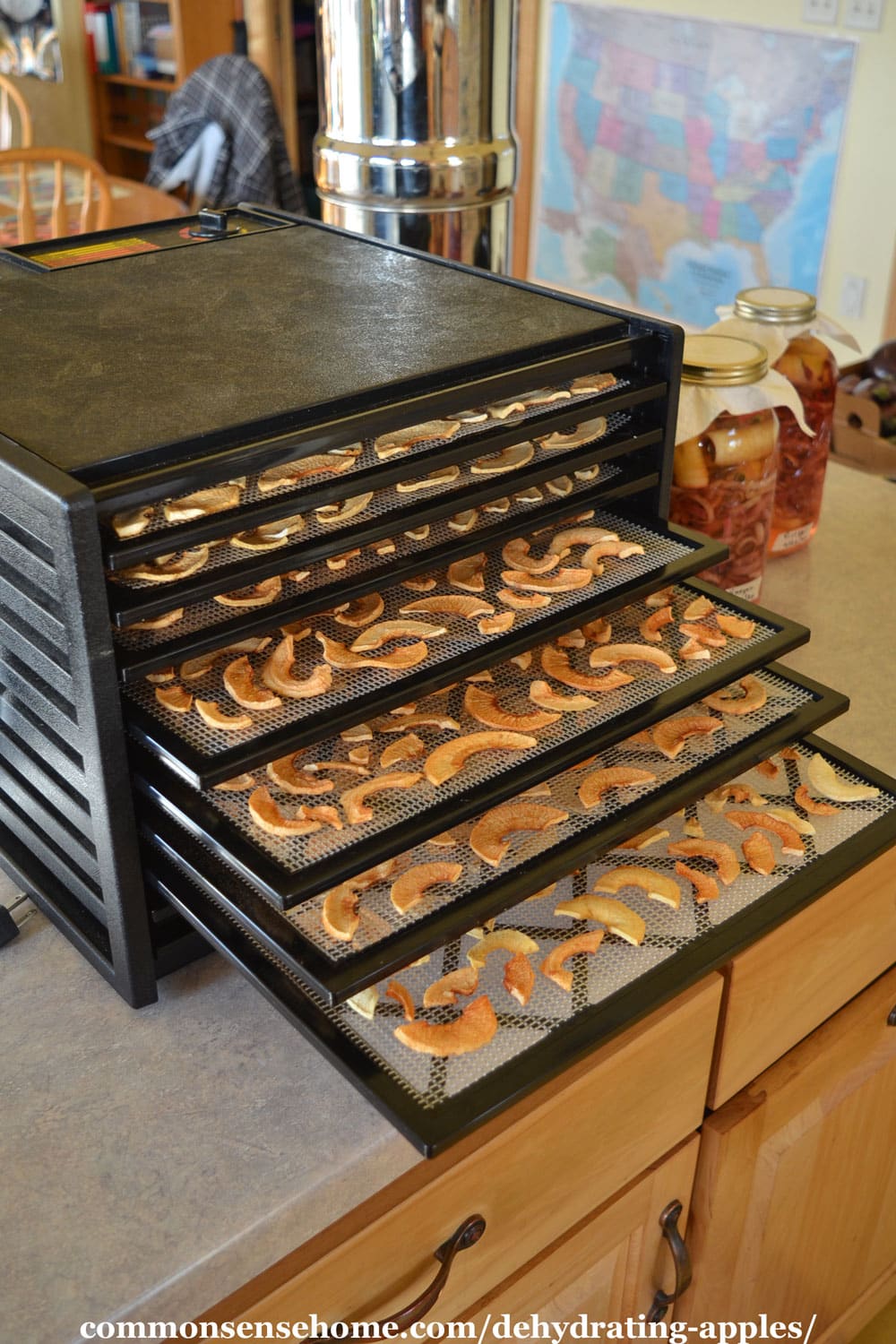
Storing Your Dried Apples
Store your dried apples in an airtight container in a cool, dry location out of direct sunlight. Date and label the container.
Properly dried, they should easily keep for year, assuming they don’t disappear into tummies. You don’t need to store them in the refrigerator or freezer.
For longer storage, I pack my dried apple slices in mason jar and seal them with a vacuum sealer. Vacuum sealed jars keep out moisture and oxygen, so your apples should easily last 2-3 years.
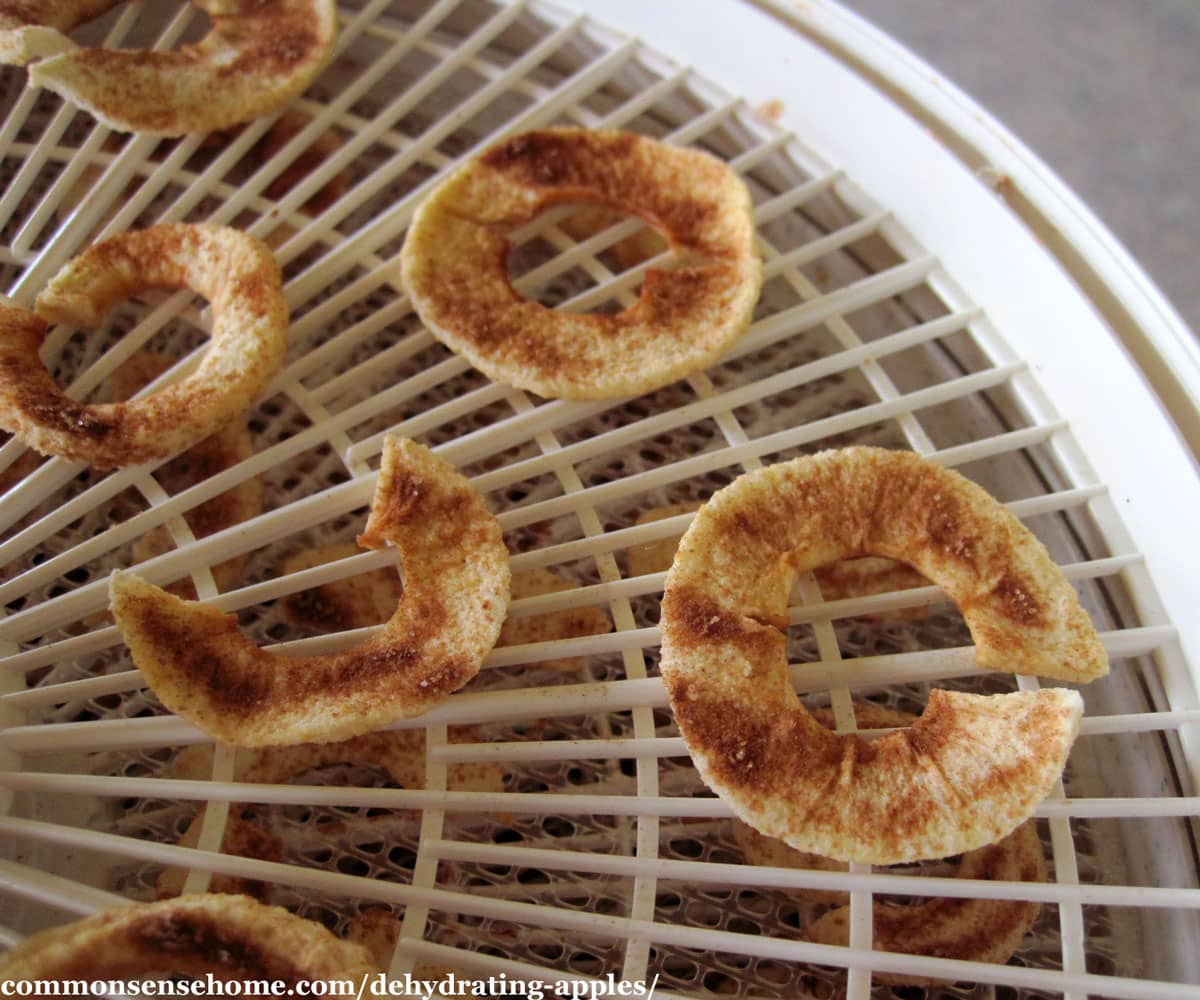
How to Dehydrate Apples in the Oven
If you can set your oven temperature low enough, you can dehydrate apples in the oven.
Set the oven temperature to warm (140F) and prop the door open a few inches to allow moisture to escape. You can place a fan near the door to increase air movement.
Place the apple slices on cooling racks that you set on baking sheets. Dry the apples for 2 to 3 hours.
Check on the apple slices after one hour. Flip them for even drying, and remove any that are done. Check again at the 2 hour mark, and so on.
You can also dehydrate apples in a solar oven. Just make sure to prop the lid open a small amount so the moisture can escape. Check the apples every hour or two, and rotate the oven as needed.
Air Drying Apples
If you live in a dry climate or have a wood stove, you may be able to air dry your apples. You can place apple rounds on wooden dowel (not touching) or use a mesh drying rack.
Hang the dryer outside and let the sun and wind do the work, or hang it near a wood stove to soak up the heat.
Air drying may take several days, depending on conditions.
Recipes for Dried Apples
Enjoy your dried apples as snacks, or crumble them into oatmeal, granola, or yogurt. Some recipes call for dried apples, like this dried apple pie.
To rehydrate, cover your apples with hot water or apple juice. Let apples soak until rehydrated, about one hour. Proceed with your apple recipe.
More Home Food Preservation Tips
We have dozens of posts on home preservation, all catalogued on the Recipes and Kitchen Tips page.
Related Articles
- Home Food Drying – 6 Things You Need to Know to Dehydrate Food at Home
- Brandied Cinnamon Apple Preserves
- Apple Scrap Vinegar – Don’t toss the peels and cores!
- Home Food Preservation – 10 Ways to Preserve Food at Home
- Root Cellars 101- Root Cellar Design, Use and Mistakes to Avoid
- Browse all of our Food Storage Articles
I hope you’ve found this post useful, and you’re welcome to share comments and questions below.



